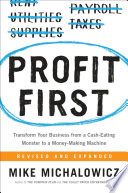

The core principle of 'Profit First' is its revolutionary formula: Sales - Profit = Expenses. This idea flips the traditional accounting formula of Sales - Expenses = Profit on its head. By prioritizing profit, business owners can ensure that they are not just surviving but thriving. The author, Mike Michalowicz, emphasizes the importance of setting aside profit first, before allocating funds for expenses. This method encourages business owners to operate within their means and fosters a mindset of profitability from the outset. By adopting this approach, businesses can create a buffer against economic downturns and unexpected expenses, ensuring long-term sustainability.
Continue readingOne of the key strategies Michalowicz introduces is the Allocation Method, which involves dividing revenue into several accounts for specific purposes. This method advocates for setting up multiple bank accounts, each designated for different financial needs: profit, owner's pay, taxes, and operating expenses. By doing this, business owners can visually track their financial health and ensure that funds are being allocated appropriately. This system helps to prevent overspending and encourages disciplined financial management, ultimately leading to improved cash flow and profitability.
Continue readingIn 'Profit First', Michalowicz highlights the significance of not just making a profit, but also distributing it effectively. He suggests that profits should be distributed to the business owner regularly, reinforcing the idea that business is meant to serve the owner, not the other way around. This distribution can be in the form of bonuses or dividends, which not only incentivizes the owner but also creates a sense of accomplishment. By treating profit as a given, business owners can cultivate a healthier relationship with their finances and prioritize their personal financial well-being.
Continue readingMichalowicz draws on principles of behavioral finance to explain why traditional accounting methods often fail business owners. He argues that human behavior plays a crucial role in financial decision-making, and that the conventional approach to profit can lead to poor financial habits. By implementing the Profit First system, business owners can align their financial practices with their natural behaviors, making it easier to prioritize profit and manage expenses. This understanding of behavioral finance is essential for creating a sustainable business model that aligns with the owner's goals and values.
Continue readingThe mindset shift from 'profit is what’s left over' to 'profit is a priority' is central to the Profit First philosophy. Michalowicz stresses that adopting this mindset is crucial for long-term success. It requires discipline and a commitment to making profit a non-negotiable part of the business model. This shift not only affects financial practices but also influences overall business strategy and decision-making. By internalizing this mindset, business owners can foster a culture of profitability within their organizations, encouraging employees and stakeholders to prioritize financial health.
Continue readingAccountability is a recurring theme in 'Profit First'. Michalowicz emphasizes the importance of having accountability partners or systems in place to ensure that business owners stick to their Profit First practices. This could involve regular financial check-ins, working with a coach, or utilizing software tools that track financial performance. By establishing accountability, business owners can maintain focus on their profit goals and avoid the common pitfalls of complacency and distraction. This support system is vital for sustaining the Profit First methodology over time.
Continue readingFinally, Michalowicz advocates for simplicity in financial management. He argues that many business owners complicate their financial systems, leading to confusion and mismanagement. The Profit First approach simplifies the process by breaking it down into manageable steps and clear allocations. This simplicity not only makes it easier for business owners to implement the system but also helps them to understand their financial situation more clearly. By focusing on straightforward strategies, business owners can reduce stress and make more informed financial decisions.
Continue readingThe reading time for Profit First depends on the reader's pace. However, this concise book summary covers the 7 key ideas from Profit First, allowing you to quickly understand the main concepts, insights, and practical applications in around 22 min.
Profit First is definitely worth reading. The book covers essential topics including The Profit First Formula, The Allocation Method, The Importance of Profit Distribution, providing practical insights and actionable advice. Whether you read the full book or our concise summary, Profit First delivers valuable knowledge that can help you improve your understanding and apply these concepts in your personal or professional life.
Profit First was written by Mike Michalowicz.
If you enjoyed Profit First by Mike Michalowicz and want to explore similar topics or deepen your understanding, we highly recommend these related book summaries:
These books cover related themes, complementary concepts, and will help you build upon the knowledge gained from Profit First. Each of these summaries provides concise insights that can further enhance your understanding and practical application of the ideas presented in Profit First.